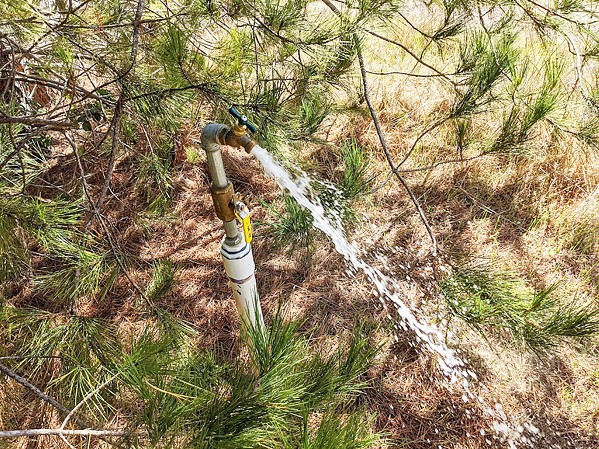Coastal Commission denies single family home projects in Cambria, citing water issues—now an applicant plans to sue
By Malea Martin[
{
"name": "Promo Temp Targeted",
"id": "PromoTempTargeted",
"class": "inlineCenter",
"insertPoint": "4",
"component": "15511697",
"requiredCountToDisplay": "0"
},
{
"name": "Ad - Medium Rectangle CC01 - 300x250 - Inline Content",
"class": "inlineCenter",
"insertPoint": "8",
"component": "15582119",
"requiredCountToDisplay": "12"
},{
"name": "Ad - Medium Rectangle LC01 - 300x250 - Inline Content",
"class": "inlineCenter",
"insertPoint": "18",
"component": "15582122",
"requiredCountToDisplay": "22"
},{
"name": "Ad - Medium Rectangle 9 - 300x250 - Inline Content",
"class": "inlineCenter",
"insertPoint": "28",
"component": "15582121",
"requiredCountToDisplay": "32"
}]
When Al Hadian bought two lots on Cambria Pines Road in 2018, he didn't expect to run into any issues while developing the properties.
He went through the San Luis Obispo County Planning Department's permitting process and was ready to build a home on his property—but then he ran into a roadblock.
"It was sent to the Coastal Commission, and all of a sudden two of the commissioners wanted to appeal the project," Hadian said.
This was in 2019, when Hadian applied to develop the first of his two neighboring properties. Commission staff said there wasn't sufficient water in Cambria to serve new developments like Hadian's.
"I thought that this would be a slam dunk because I have a water meter that is active, I am paying my bills, I'm a pre-moratorium customer," Hadian said, but the project was ultimately denied.
Now, he's trying again: He wants to build a single family residence, a detached garage, a gazebo, a greenhouse, a porch, and a couple of decks on his other property. The project was approved by the county last year and even survived a public appeal in September.
But once again, the California Coastal Commission staff recommended denial of Hadian's project at its March 11 meeting. They also recommended denial of a similar project proposed by Ralph Bookout, also on Cambria Pines Road.
"Cambria has a longstanding water issue," Coastal Commission planner Esme Wahl told New Times. "Cambria gets all of its water from San Simeon and Santa Rosa creeks, and current extractions of these creeks are adversely affecting the creeks and their associated riparian habitats."
Wahl said that SLO County's Local Coastal Program (LCP) requires coastal watershed streams and riparian vegetation to be protected. It also requires an adequate and sustainable water supply to serve development.
"We're not able to make either of those findings, and as a result, we have to deny this new development in Cambria," Wahl said.
Hadian argues that because his properties have water meters that predate the Cambria Community Services District (CCSD) Water Code Section 350 emergency declaration in November 2001—which created a development moratorium—he is entitled to water service on his property and should be able to develop it. These grandfathered water meters are defined by the CCSD as non-active service commitments that are connected to the district's water system.
"Grandfathers pay minimum bimonthly billing to maintain their status," the CCSD's website states.
Hadian said the owners of his properties have paid those bills since April 2001, which predates the water emergency declaration by about six months. Hadian's two properties and Bookout's property are all listed as existing commitments in a 2021 document posted on the CCSD's website.
When the county Planning Department approved Hadian's project in 2021, it was appealed by a few members of the public. That appeal was denied by the county Board of Supervisors, and at the time, the board cited Hadian's grandfathered water meter as a reason for upholding the Planning Department's approval.
"Adequate public service capacities are available to serve the proposed development because the project is using [a] grandfathered meter and was part of the CCSD's existing commitment list," the board's findings state.
About the time the moratorium was adopted, the CCSD determined that the water demand for its existing commitments was equivalent to just more than 200 dwelling units. The Coastal Commission recognized these existing commitments as exempt from the moratorium in a 2002 permit granted to Steve and Sue Monaco, according to board findings.
"In addition, in 2007, the Coastal Commission approved the North Coast Area Plan, which included [a] requirement that allowed for development of 'water service commitments existing as of Nov. 15, 2001,'" the findings state.
The CCSD reiterated its support for the projects during public comment at the March 11 Coastal Commission meeting.
"We indeed do stand by our contractual obligation to provide water service to all the lots in tract 1804," where Hadian's and Booking's properties are located, CCSD Utilities Department Manager/District Engineer Ray Dienzo said.
But Wahl with the Coastal Commission said a commitment from the CCSD isn't going to cut it.
"Our standard of review is the Local Coastal Program, and not an outside document like a commitment they have with CCSD," Wahl told New Times. "Based on the fact that [water] extractions are negatively affecting the creeks, which is not compliant with the LCPs, we can't approve these."
Water debacles aside, there's also the Monterey pine trees that both Hadian's and Bookout's projects propose cutting down. Hadian's project proposal includes the removal of 50 trees, and Bookout's would cut down 70.
"There's a lot of policies that protect significant forest resources, and Monterey pine forest is one of those," Wahl said. "Both of them would be cutting down a significant number of trees, so there's a second issue here."
Hadian told New Times that the majority of the trees he plans to cut down are dying from pitch canker disease. He has already started planting new seedlings, with plans to plant four for every tree he cuts down.
"I'm not destroying the forest at all, I am actually reviving this forest," Hadian said. "As soon as I have a roof ready, I have plans to harvest my roof rain water and use it exclusively for irrigation purposes so that I cut off my use of potable water from CCSD."
Despite the two applicants' arguments, the Coastal Commission ultimately followed staff recommendations to deny Hadian's and Bookout's projects at its March 11 meeting.
"The reality is, there's a severe water problem in Cambria, and when a project cannot be served by a sustainable source, as is the case here, the LCP explicitly requires denial," Wahl told commissioners during the meeting. "The projects are significantly inconsistent with LCP provisions for water supply, ESHA [environmentally sensitive habitat areas], and related resources."
Hadian said he feels unfairly caught in the crosshairs of a problem between the Coastal Commission and the CCSD. He believes that issue dates back to the water reclamation facility the CCSD implemented under an emergency permit.
"During 2014, Gov. Brown authorized water municipalities to do whatever they can to get more water because of the drought condition. So the CCSD took advantage of that law and without going to the Coastal Commission, they built their water reclamation facility," Hadian said. "So because of that, there's a problem between the Coastal Commission and the CCSD. ... I don't think it is right for me to be a collateral kind of hostage here between the two agencies, which I have nothing to do with."
Despite the commission's decision, Hadian said he isn't giving up.
"We are going to take legal action because my constitutional right is being violated," he said, "and as a matter of principle I am going to have to defend my constitutional right." Δ
Reach Staff Writer Malea Martin at [email protected].
Latest in News
Comments
Showing 1-1 of 1
Readers also liked…
-

SLO police identify alleged driver who hit and killed couple
Dec 22, 2022 -

When the levee breaks: Oceano residents, county officials walk a tightrope of regulations to manage Arroyo Grande Creek, which some say led to the levee's failure in January
May 18, 2023 -

Cal Poly report highlights offshore wind's potential to spur green energy transition
Jun 8, 2023









